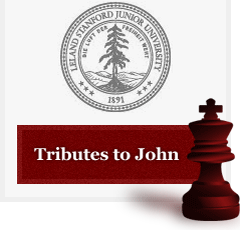General Information
John McCarthy was a Professor of Computer Science at Stanford University. He was interested in developing systems that exhibited human-level intelligence since 1948 and coined the term "Artificial Intelligence" in 1955, five years after Alan Turing proposed the Turing Test for Intelligence.
John's key contributions to the field of Artificial Intelligence were in Commonsense Reasoning which he pioneered and Nonmonotonic Reasoning.
John invented the LISP programming language in 1958, developed the concept of time-sharing in the late fifties and early sixties, and has worked on proving that computer programs meet their specifications since the early sixties. He invented the circumscription method of non-monotonic reasoning in 1978 and refined it diring the 1980s.
John received the A. M. Turing Award of the Association for Computing Machinery in 1971 and was elected President of the American Association for Artificial Intelligence for 1983-84 and became a Fellow of that organization. He received the first Research Excellence Award of the International Joint Conference on Artificial Intelligence in 1985, the Kyoto Prize of the Inamori Foundation in November 1988, the National Medal of Science in 1990, and teh Benjamin Franklin Medla in 2003. He was an active member of the American Academy of Arts and Sciences, the National Academy of Engineering and the National Academy of Sciences. He received honorary degrees from Linkoping University in Sweden, the Polytechnic University of Madrid, Colby College, Trinity College, Dublin and Concordia University in Montreal, Canada. He has been declared a Distinguished Alumnus by the California Institute of Technology.

Documents of Historical Interest
The Program for the Dedication of Margaret Jacks Hall in the Quad at Stanford. It gives a glimpse into the Computer Science Department that John helped to create and build into the top Computer Science Department.
Please send other historical documents to ProjectJMC@TheMagicLab.org










